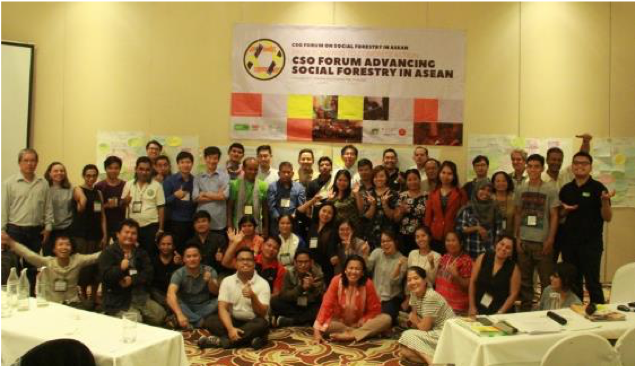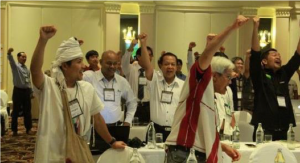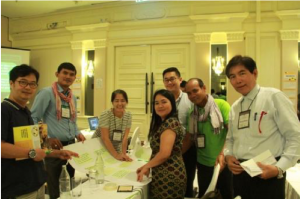First published on 06/25/2017, and last updated on 03/25/2018
By: Tanya Conlu, NTFP-EP and regional coordinator for Southeast Asia for the ICCA Consortium
On June 9-10, 2017, civil society organizations (CSO) from Southeast Asia gathered in Chiang Mai, Thailand, to have their annual discussions on social forestry, or what is known as community forestry. The CSO Forum on Social Forestry was established in 2012 as a platform to distil, consolidate and relate key messages from CSOs and communities to Association of Southeast Asian Nations (ASEAN) through the ASEAN Working Group on Social Forestry. It is made up of civil society, community-based, and indigenous organizations and networks working on forest tenure, livelihood, traditional knowledge, climate change, and other related themes.
This year the gathering was attended by over 60 participants from 40 organizations and communities in eight countries. The forum took off from the country and thematic plans which have been developed from the previous meetings, and now aims to elevate its efforts into continuously increasing the knowledge, exchanging experience and information among participating organizations, strengthening advocacy and networking, and elevating regional collaborations.
Representatives of ICCA Consortium Members NTFP-EP, Pan Nature, PACOS Trust, and WGII were present and gave focus to ICCAs in the discussions. Ms. Thi Hai Van Nguyen of Pan Nature presented the efforts of the Vietnam ICCA Learning Group in promoting the official recognition of ICCAs in their country through the new forestry and biodiversity law, and stressed that ICCAs should be recognized by government as a type of special use forest system. Mr. Gordon John Thomas of PACOS Trust presented a case study of tagal hutan, a customary governance system in Malaysia, and pointed out that ICCAs are not only a patch of forest but a holistic conservation area based on traditional knowledge. Other presenters talked about security of communities and activists, country developments on legalities and implementation of tenure instruments, community livelihood, shifting cultivation, and other traditional conservation practices.
Every year the forum comes up with a strong and concrete message and recommendations on social forestry which are delivered at the ASEAN Working Group on Social Forestry (AWG SF) Conference, which takes place immediately after the CSO Forum. AWG SF is a government driven network established to strengthen ASEAN cooperation in social forestry through the sharing of information and knowledge (http://www.awg-sf.org). As delegates of ASEAN member states discussed, shared and lobbied issues on social forestry, the CSO Forum brought forward the key messages from their meeting.
Mr. Kittisak Rattanakrajangsri, Chairperson of Asia Indigenous Peoples Pact (AIPP), addressed the host, the Thai government, in behalf of the Thai CSOs who participated. He relayed that as indigenous communities living in forest areas depend on the forest for survival and have taken care of their forests for a long time, there should be strong measures to protect them from illegal encroachers, extractive industries, large scale plantations and big infrastructure development projects. He emphasized that communities must be guaranteed protection from any harm or negative impacts while these measures are being implemented. He pointed out that it is not by coincidence that most of the remaining forestlands in Thailand are home to indigenous peoples and local communities.
For the rest of the ASEAN members, Ms. Mai Thin Yu Mon from Myanmar delivered the collective statement of the CSOs from eight countries. She said that a critical bottleneck in social forestry is that there is no or weak recognition of tenure of ICCAs and their associated knowledge, making forest dependent communities more vulnerable to conflicts due to public and private development projects. She also mentioned that despite documented evidence, shifting cultivation is still not recognized as a sustainable land management practice, and that there is limited capacity in applying policies on community safeguards and Free Prior Informed Consent (FPIC). She relayed the recommendations of the CSOs, which include: support the establishment of proven management and governance arrangements in forested landscapes particularly ICCA and co-management; ensure that customary tenure rights and access to forest and farmland are secured; monitor development investment strictly; ensure security of communities and advocates, and that there should be an accessible and effective community grievance mechanism; and recognize traditional knowledge and self-governance, and ensure that processes for securing communal land titles are faster and more efficient.
While these messages were well received by the delegates, the actual work goes back to the participants’ respective countries, where CSOs have to lobby with their governments the details of how these recommendations will be carried out. Nevertheless, active CSO participation in the AWG SF has been instrumental in advancing the rights and interests of forest-dependent communities.
The 6th CSO Forum on Social Forestry was organized by Non-Timber Forest Products – Exchange Programme in partnership with the CSO Forum on Social Forestry Regional and Thematic Working Groups, Asia Indigenous Peoples Pact (AIPP), and Indigenous Peoples’ Foundation for Education and the Environment (IPF), in collaboration with the Inter Mountain Peoples Education and Culture in Thailand Association (IMPECT) and the Indigenous Women of Thailand Network (IWNT), with support from the Swiss Development Cooperation (SDC).
- Participants sing, dance and cheer during solidarity night ©NTFP-EP
- CSO Forum representatives discuss in a workshop the network’s action plan in terms of forest tenure and access rights, governance, safeguards, and livelihoods ©NTFP-EP


